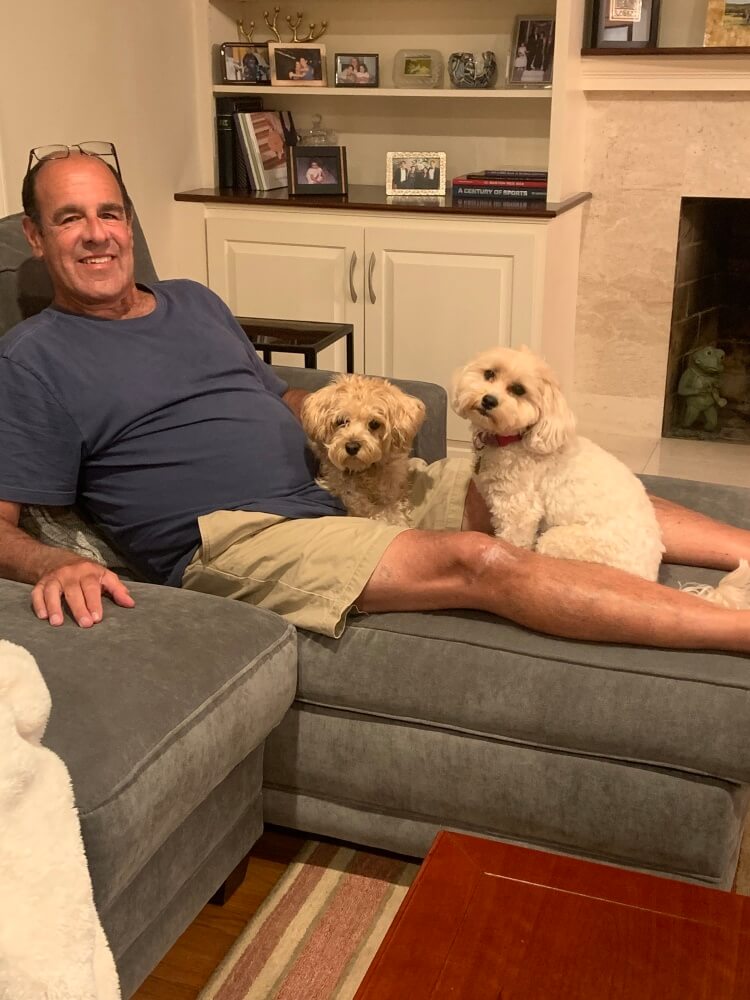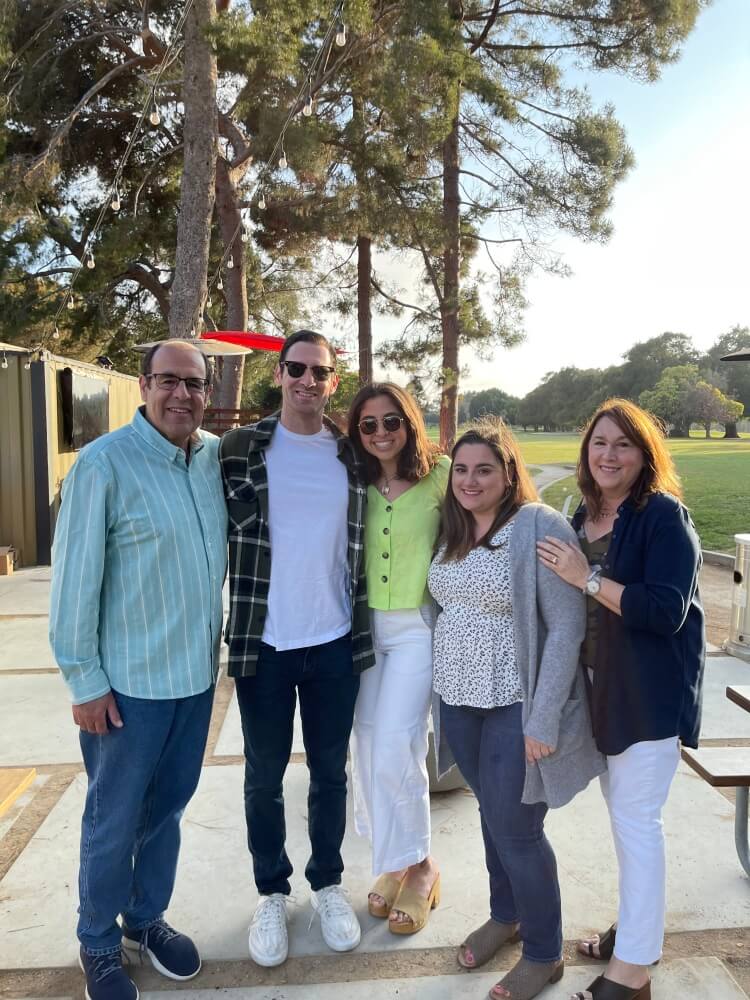The last thing Alan Rubin imagined he’d be doing after retiring from a successful career in financial services was helping his son run a hot dog cart.
Then he was diagnosed with stage III kidney cancer, and found himself in another unexpected locale: Dana-Farber Brigham Cancer Center. Like the decision to join his son’s business venture, it was a move Rubin, 66, made with family in mind.
“You want to put yourself in the best situation to survive,” says Rubin. “As soon as I got to Dana-Farber, I knew I was in the right place. I could not be more comfortable or confident in my care.”

Finding a fit
Rubin, a Needham, Mass., resident, was in Los Angeles in October 2019 when he noticed blood in his urine. Already living with vasculitis, a rare autoimmune disease, he was concerned enough to fly home and visit his doctor immediately.
Tests revealed a cancerous mass in Rubin’s right kidney, which had also infringed upon his lymph nodes. He had surgery to remove the kidney at a Boston-area hospital, after which specialists there recommended a “watch and wait” approach of scans every six months to check for any new cancer growth.
“With my personality and temperament, that just didn’t satisfy me,” says Rubin. “I was willing to go anywhere that offered a more aggressive treatment plan that also took my vasculitis into account.”
Such a place was just a few miles from home. Visiting Dana-Farber Brigham for a second opinion, Rubin was impressed by the fact many clinicians in the Lank Center for Genitourinary Oncology were also conducting research. He switched his care there, and when his cancer returned in July 2022 — this time in his left lung — his Dana-Farber Brigham team found a clinical trial he could safely join in August despite his concurrent autoimmune disease. Seven months later, he was having a complete response to treatment with no cancer evident in his scans.
Unforeseen preparation
In addition to the support of his family and a Dana-Farber Brigham care team led first by David Braun, MD, PhD, and now by Wenxin (Vincent) Xu, MD, Rubin says two prior life experiences have also played a role in getting him through his cancer journey.
The first came when his early retirement after 30 years in finance coincided with his son Sam’s 2014 graduation from college. Sam decided to run his own hot dog cart for a year before embarking on a long-term career path, and Rubin signed on as his “gopher” so they could enjoy more quality time together. Running around town buying supplies, and occasionally taking shifts operating the cart, Rubin was surprised to find he loved the job — so much so that he became boss of “Sam’s Hot Dogs” when its namesake left for California and a job in the entertainment industry after a year.
“The cart was always about fun,” Rubin says. “I used to joke that I gave away more hot dogs than I sold, but it beat sitting in a downtown office.”

The fun stopped temporarily in 2015, as Rubin was forced to shut down the cart due to three bouts of pneumonia that left him hospitalized. Standard pneumonia treatments like antibiotics proved ineffective, and further tests revealed he had vasculitis, an inflammation of the blood vessels that can impact various organs. In Rubin’s case his lungs, kidneys, and peripheral nerves were most affected.
Six months of intensive treatments including chemotherapy-like infusions saved Rubin’s life, but also led to numerous side-effects including severe neuropathy.
“I was so weak and unstable on my feet due to muscle atrophy and nerve damage from the vasculitis that I needed to learn how to walk again,” Rubin recalls.
He didn’t know it yet, but this period also helped prepare him for his next big challenge.

Making adjustments
Just after Rubin and Sam saw legendary rockers The Who perform at the Hollywood Bowl in Los Angeles, Rubin noticed the blood in his urine that led to his cancer diagnosis.
“Until hearing I had cancer, I never realized that my vasculitis had given me a greater appreciation for life,” says Rubin. “It reinforced how important it was to take things one day at a time, don’t look back, and not question ‘Why me?’.”
He took this mantra to heart, taking long walks, enjoying life with his wife Mindy, daughter Rachelle, and Sam, and getting outside with his hot dog cart whenever possible. After a cancerous nodule was found in his upper left lung in 2021, the nodule was removed, but more aggressive tumor growth a year later prompted Xu and his team to take another approach.
“Arguably the most important class of medications we have to treat kidney cancer today boost the immune system and make it more active,” explains Xu. “Those immune checkpoint inhibitor medications are more dangerous for someone who has an underlying autoimmune condition like Alan because you can potentially make that autoimmune condition worse. So we decided to go with a different experimental treatment.”
This was the LITESPARK-003 clinical trial, which Rubin joined in August 2022. He received a treatment that included both an approved drug, cabozantinib, and an experimental drug, belzutifan, which was developed as a result of Nobel Prize-winning research from the Dana-Farber laboratory of William G. Kaelin Jr., MD. Rubin started to see a decrease in his tumors almost immediately, and by March 2023 had achieved a complete response — no evidence of cancer in his scans — that Xu calls “fantastic.”
Today, Rubin is continuing the LITESPARK-003 trial, and while he’s shut down Sam’s Hot Dogs for good, he’s still relishing every minute of life. Adventures in 2023 include participating in his second Boston Marathon® Jimmy Fund Walk in October, and a family trip to Aruba in December.
“Right now I’m in a good spot,” says Rubin. “Some days are better than others, but whatever happens you learn to adjust or recalibrate.”

Thanks for sharing with us about retiree relishing life after advanced kidney cancer treatment.
As a cancer survivor, I can attest to the importance of cutting-edge cancer medicine. It’s heartwarming to read about the progress being made in this field. Kudos to everyone involved.